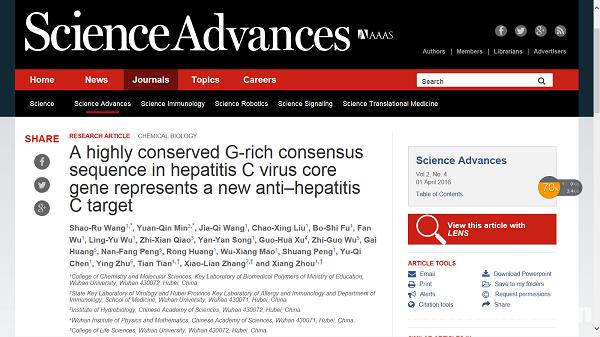On April 1st, Science Advances published online the research findings on HCV by Zhang Xiaolian’s research group from Wuhan University School of Basic Medical Sciences, Medical Reseach Institute of Wuhan University and State Key Laboratory of Virology, and Zhou Xiang’s research group from the School of Chemistry and Molecular Sciences with Wuhan University affiliations.
Viral hepatitis is one of the most serious infectious diseases in China. Approximately 40 million Chinese people are infected with HCV. This becomes a major cause of cirrhosis and hepatic carcinoma. This research, however, provides a new method for the development of anti-hepatitis drugs.
The article was titled A highly conserved G-rich consensus sequence in hepatitis C virus core gene represents a new anti–hepatitis C target. Zhang Xiaolian, Zhou Xiang and Tian Tian from Zhou Xiang’s group are co-corresponding authors of the paper and Wang Shaoru, Min Yuanqin are joint first authors. The article pointed out that recent years witnessed crucial development in HCV treatment. G-quadruplex (G4) is one of the most important structures in nucleic acids that exist widely in viral genome, cancer genome and telomere. G4 in virus also plays a pivotal part in virus replication, translation and immune evasion. G4 RNAs have not been discovered in any RNA virus, such as HCV. The research group found the existence of highly conserved guanine-rich consensus sequences within the core gene of hepatitis C. Meanwhile, comprehensive methods were taken to prove the possibility of such conserved sequences being folded into unimolecular G4 structures despite the high genetic variability of this RNA virus.
Furthermore, the research groups also provided direct evidence that small molecules specifically targeting G4 can stabilize the structure to reduce RNA replication and inhibit protein translation of intracellular hepatitis C. Ultimately, the stabilization of G4 RNA in the genome of hepatitis C represents a promising new strategy for anti–hepatitis C drug development.
